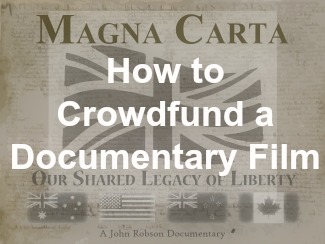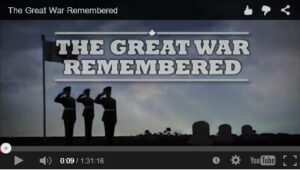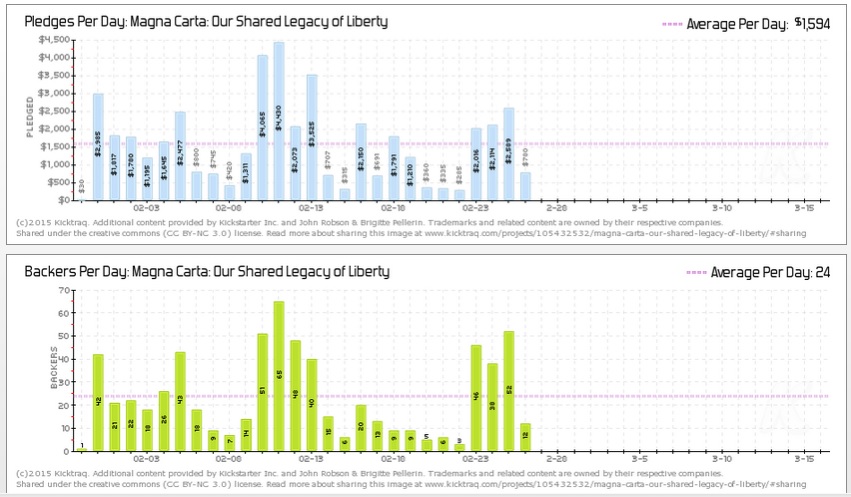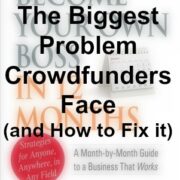Using the Media for Documentary Crowdfunding
Today’s campaign review comes from the husband and wife communications team behind the documentary crowdfunding campaign, Magna Carta: Our Shared Legacy of Liberty.
John and Brigitte have spent more than two decades working in Canada’s national media environment as radio and television broadcasters and columnists. This is their first crowdfunding campaign but great planning and outreach has helped them raise nearly $50,000 of their goal.
Here on the Crowd101 blog, we love to hear from crowdfunding campaigns about how they are using the new movement to fund their dreams. If you’re thinking about launching a crowdfunding campaign, you’ll never find better advice that from the people that are making it work. It’s a great opportunity to learn from their success and their mistakes.
What is your documentary crowdfunding campaign about?
Last year we had a blast producing our feature-length documentary The Great War Remembered, planning, designing, directing and hosting it. So this year we are producing a feature-length documentary on the 800th anniversary of the Magna Carta, the cornerstone of our rights and liberties in Canada and throughout the Anglosphere. We decided to crowdfund the Magna Carta documentary because it’s a story about people’s rights and we want it to be a movie funded by the people. We also wanted to avoid the bureaucracy and conditions attached to the government grants that are the usual route for such productions in Canada.
The editorial freedom that comes with crowdfunding has been something we’ve seen a lot lately. Crowdfunding journalism and film is bringing stories directly to audiences without having to go through corporate censors afraid to peeve off sponsors or other parties.
Did you try to raise funding for your documentary before crowdfunding?
It’s our first crowdfunding campaign and so far (we say, keeping all fingers and toes neatly crossed) it’s going well. But man, is it nerve-wracking.
What did you do before starting the crowdfunding campaign to get ready? Can you take us through your process?
Crowdfunding is a lot like parenthood. You can be as prepared as you possibly can – you have all the elements in place, you have built a dedicated website for the documentary, shot and edited a presentation video, polished your presentation and sweated each comma. Then you submit your campaign to Kickstarter, it gets approved, and you hit the magic button to make it go live. They you go “Wow! We can do this!”
Then an equal mix of exhilaration and panic set in. What if nobody contributes? What if we did it all wrong? What if there were willing supporters out there and we screwed it up? Or will we be amazingly successful? Will we become a news story? Crowdfunding documentary stars? Understand that we live and work in Canada where the culture of crowdfunding isn’t where it is in the United States. The overwhelming majority of our backers are first-timers. Which is extraordinarily cool and scary. We are taking a big chance.
We haven’t hired any outsiders to help with our campaign. Being familiar with our media environment it wasn’t overly difficult for us to line up interviews to promote the project. We talked about it on radio and television shows. We reached out to groups interested in the topic and made presentations to them. We also contacted bloggers we knew would be interested and they helped us share our story. This is very valuable indeed and we got a lot of exposure. Thanks to everyone who had us on their shows or promoted us online, by the way.
The campaign has done great so far, raising nearly $50k of its $75k goal. While it doesn’t sound like as much outreach was done pre-launch to get the campaign off the ground, Brigitte and John have been building their outreach network for more than 20 years. Looking at the Kicktraq charts for the campaign, it’s been really consistent in daily contributions and backers. A lot of this is due to the content stream of media exposure from the team.
While you don’t need decades to build a great network for your campaign, you should spend at least three months in crowdfunding pre-launch. Check out an earlier post detailing step-by-step the groups you need to reach in crowdfunding outreach and how to get them involved in your campaign. Their experience in media makes a lot of the most important outreach activities second nature for the couple.
A lot of crowdfunding campaigns stop with a single video on their crowdfunding page. If you are already making one video, why not make a series of teaser videos that you can put on YouTube, Vimeo and other sites? John and Brigitte have gotten thousands of views on their YouTube videos for the Magna Carta crowdfunding campaign.
What is the biggest mistake you’ve made so far in crowdfunding?
Our biggest mistake? We did not have a ready-made list of contacts in the United States. We also wish our promotional video had been ready sooner – we could have teased our network with that video on YouTube ahead of the Kickstarter launch. For various reasons (but no excuses here, they don’t get the dogs fed) we had to rush to get it ready and there were a few minor technical issues because of the hurry.
We’re doing fairly well, in good part because we already had a fairly big social network. We were able to share our project with these fine folks pretty easily, and have them share to their friends as well. We make a point of adding our backers to our existing networks so we can keep our backers engaged throughout the process.
When you Kickstart, you’re asking people to be part of a dream and it’s both courteous and sensible to keep them involved. It’s also crucial to remember to thank each backer personally.
If they are good enough to support our project, they’re good enough to get a personalized (not copy-and-paste) thank you from us. Brigitte and John have done a great job with keeping their network updated. They have updated their Kickstarter campaign page nine times and I have used their own email accounts to update even more frequently. Besides keeping backers in the loop, potential backers see this kind of engagement and it helps build trust and confidence in the campaign.
Is there anything else people should know about raising money through documentary crowdfunding?
So what should people know about crowdfunding? Look, we’re not experts. This is our first time, but so far we’re confident in saying 1) You need a lot of Facebook friends and Twitter followers2) You need to devote a solid 4-6 hours a day (if not more) to managing your campaign – pushing it out there, contacting reporters, thanking backers, promoting some more3) When it’s working well, it’s a lot of fun on slow days, don’t get down, get busy promoting it. Brigitte hits on some great points here.
· Don’t confuse having a lot of Facebook fans and Twitter followers with having real fans and followers. You can have a thousand fans but if you rarely talk to them, they may not help the campaign much. Reach out to your network ahead of time and reestablish that connection you had once.
· Crowdfunding campaigns can easily become a part-time or full-time job. This is why you need a team of at least two or three people to help out.
· Crowdfunding can be exhilarating and it can be a big disappointment. Putting the time in before launch in planning and outreach can really help to drive funding.
What’s next for you?
Once this project succeeds (did we mention that staying positive is crucial?) we intend to make more videos. They won’t all be feature-length. Some will be small and quirky, others big and bold. We’re looking forward to being more active in the Kickstarter community and backing other Kickstarter campaigns. Having anxiously watched for contributions on slow days and rejoiced in them on good ones, it’s good karma to do unto others as we have wanted them to do unto us.
I want to thank Brigitte and John for sharing their documentary crowdfunding campaign experience. There is a lot of good advice here for crowdfunders thinking about putting together campaigns of their own.






